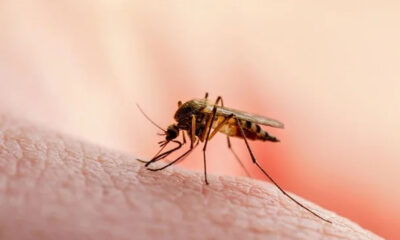Health
World Mosquito Day: Declare state of emergency on malaria, Reps urge Tinubu

As Nigeria joins the rest of the world to mark the 2023 World Mosquito Day, the Chairman, House of Representatives Committee on HIV/AIDS, Tuberculosis and Malaria, Amobi Ogah, has urged the Federal Government to declare a state of emergency on malaria, describing it as a deadly parasite with potential to inflict woes on the citizenry.
Ogah, who represents Isuiwuato/Umunneochi Federal Constituency of Abia State, stated this in a statement in Abuja yesterday, following the 2023 commemoration of World Mosquito Day.
According to him, the World Mosquito Day is commemorated on August 20 globally and the theme for 2023 is “Fighting the World’s Deadliest killer -the Mosquito. “
He said the aim was to raise awareness about the causes of malaria and how it could be prevented as well as the danger posed by mosquitoes and mosquito-borne diseases.
He said it was also to lay emphasis on the ongoing global efforts towards combating the world’s deadliest creature.
Ogah said further that considering the threat malaria posed to humanity, every effort must be geared towards eradicating one of the deadliest killer mosquitoes.
READ ALSO:
- 23 LGAs in three northern states battling kidnappers, cattle rustlers, terrorists
-
I won’t take part in Republican debates – Trump
-
Dangote, Rabiu make over N300bn in one week, to move up in Global Ranking
He said: “The House Committee on HIV, AIDS, Tuberculosis and Malaria Control is not unmindful of the challenges being faced by Nigerians in the fight against these ailments especially in the fight against the control of Malaria in the country which appear to defile solutions.
” The committee will work with relevant stakeholders in the fight against malaria in ensuring that monies budgeted for are used for the purpose for which they are made.
“According to the World Health Organization, Four African countries accounted for just over half of all malaria deaths worldwide: Nigeria top this list with 31.3%, followed by the Democratic Republic of the Congo with 12.6%, Tanzania (4.1%) and Niger (3.9%).
Health
NAFDAC destroys N5bn fake, expired products in Aba

NAFDAC destroys N5bn fake, expired products in Aba
The National Agency for Food and Drug Administration and Control (NAFDAC) has shut down 150 shops at Eziukwu Market in Abia over fake and expired products Worth N5 billion.
The agency disclosed this in a statement on Wednesday on X.
NAFDAC said the shops were shut during a two-day operation on December 16 and 17, while products valued at N5billion were destroyed at the market.
The director of the South-East zone, Martins Iluyomade, expressed dismay at the continued illegal activities despite a previous undertaking signed by market leaders in December 2023 to expose counterfeiters.
READ ALSO:
- Speaker Abbas to Tinubu: Your reforms have disrupted status quo
- Abuja demolition: Soldiers attack FCTA officials, seize vehicles
- Onion price rises over 100%, flooding, inflation blamed
According to the statement, Mr Iluyomade described the market as a hub for counterfeit and substandard products.
“Our team uncovered a large-scale production and distribution of fake and expired goods, including beverages, carbonated drinks, wines, spirits, and vegetable oils.
“Revalidated food items such as milk, yoghurt, noodles among others were also destroyed,” the statement said.
It reaffirmed NAFDAC zero tolerance for such practices and emphasised its unwavering commitment to safeguarding public health while working toward a permanent solution to the problem of counterfeiting in the market
NAFDAC destroys N5bn fake, expired products in Aba
(NAN)
Health
Eating fish regularly minimises risk of incurable hearing condition – Study

Eating fish regularly minimises risk of incurable hearing condition – Study
Tinnitus is the sound of ringing in the ears. It may also be described as roaring, buzzing, hissing, or clicking inside the head. The sounds may come and go. Or they may be ongoing. The sounds range in severity from a mild distraction to a disabling condition and may manifest with buzzing, hissing, or clicking inside the head.
The sound may happen in one or both ears and may have different tones. A team from Brigham and Women’s Hospital in Boston studied 73,000 individuals to understand how common this disorder is, which affects millions with a constant ringing in their ears.
Over a span of 30 years, those who consumed more than two servings of fish weekly had nearly 25 percent lower odds of getting tinnitus compared to those who seldom or never ate fish. Even eating just one serving a week resulted in a 13 percent reduced risk.
Certain types of fish, like tuna, light-fleshed varieties such as cod or halibut, and shellfish, were linked to a reduced risk, while darker fish like salmon and swordfish seemed to increase the risk.
READ ALSO:
- No litigation delaying Lekki int’l airport construction, says Lagos govt
- Ondo: Jilted husband kills self, sets wife ablaze
- Military sends Special Operations Brigade to quash Lakurawa terrorists
Interestingly, fish oil supplements, known for their benefits to heart, brain, and joint health, were also connected to a higher risk of tinnitus. It’s estimated that tinnitus is diagnosed in almost 1 in 6 persons.
While age-related hearing loss, ear injuries, and circulation issues are known to contribute to tinnitus, the exact cause remains unclear. Previous studies have suggested that dietary factors, such as high levels of calcium, iron, and fat, might heighten the risk. However, this new research is the first to analyse data over such a lengthy period.
Past findings have also shown that seafood can lower the risk of hearing loss, with one study suggesting that increased fish consumption might reduce hearing issues by up to 20 percent. Scientists believe that the omega-3 fatty acids in fish could protect inner ear cells or reduce inflammation caused by loud sounds, chemicals, or infections.
The Boston team’s investigation, based on a database of US nurses, aims to shed light on the connection between fish consumption and tinnitus, potentially aiding future patients. The authors of the study expressed hope that identifying factors that can be changed might help in preventing tinnitus and guiding targeted treatments.
Eating fish regularly minimises risk of incurable hearing condition – Study
Health
Nigerian doctor claims increased s3xual activity lowers cancer risk for women

Nigerian doctor claims increased s3xual activity lowers cancer risk for women
Dr. Rasheed Abassi, a Nigerian medical practitioner, has sparked widespread debate following comments on TVC’s programme Your View, where he recommended increased sexual activity for women as a way to reduce the risk of breast cancer.
The doctor also advised men to consider polygamy, citing its potential health benefits, including a lower risk of prostate cancer.
“Women need to have more sex to reduce breast cancer risk. When a woman reaches orgasm, she releases oxytocin, which lowers her chances of developing cancer,” Dr. Abassi stated during the interview.
READ ALSO:
- Four suspected suppliers of soldier, police uniforms to bandits arrested in Katsina
- Ogun father arrested for allegedly killing two-month-old son for ritual
- Midnight fire guts popular Alaba Rago Market in Lagos
Addressing men’s health, Dr. Abassi claimed that polygamy could improve longevity and reduce prostate issues. “Men with two to three wives live longer than men with one wife. If your son is not getting rid of his DHT (dihydrotestosterone), he is likely to develop an enlarged prostate,” he said.
He also linked the absence of regular erections to potential cardiac problems. “Any man not waking with a full erection already has cardiac issues. My oldest patient is 92 years old and has a four-year-old daughter — and that’s DNA-proven,” he revealed.
When asked about the risks of sexually transmitted infections (STIs) associated with increased sexual activity, Dr. Abassi emphasised the importance of safe practices. “The condom is not 100% protective, but we still advise it. Awareness is key,” he said.
He also noted that some men cite the cost of contraceptives as a challenge, comparing it to the financial costs of engaging in sexual activities.
Nigerian doctor claims increased s3xual activity lowers cancer risk for women
-

 Business2 days ago
Business2 days agoBe creative, monarch, others challenge Muslim professionals on economic revival
-

 Auto1 day ago
Auto1 day agoLSM MD extols founder’s qualities after latter posthumous industry award
-

 Entertainment2 days ago
Entertainment2 days agoMultiChoice announces free access to all DSTV channels for 3 days
-

 metro2 days ago
metro2 days agoJigawa State governor loses son 24 hours after mother’s death
-

 News1 day ago
News1 day agoNigeria Customs Service begins 2025 recruitment [How to apply]
-

 metro1 day ago
metro1 day agoHeavy security in Ilesa as ex-Osun deputy gov emerges new Owa-Obokun
-

 metro1 day ago
metro1 day agoLagos Imam to Tinubu: You haven’t disappointed us
-

 metro1 day ago
metro1 day agoDangote, Tinubu, Lookman named among 100 most influential Africans in 2024 (Full list)









